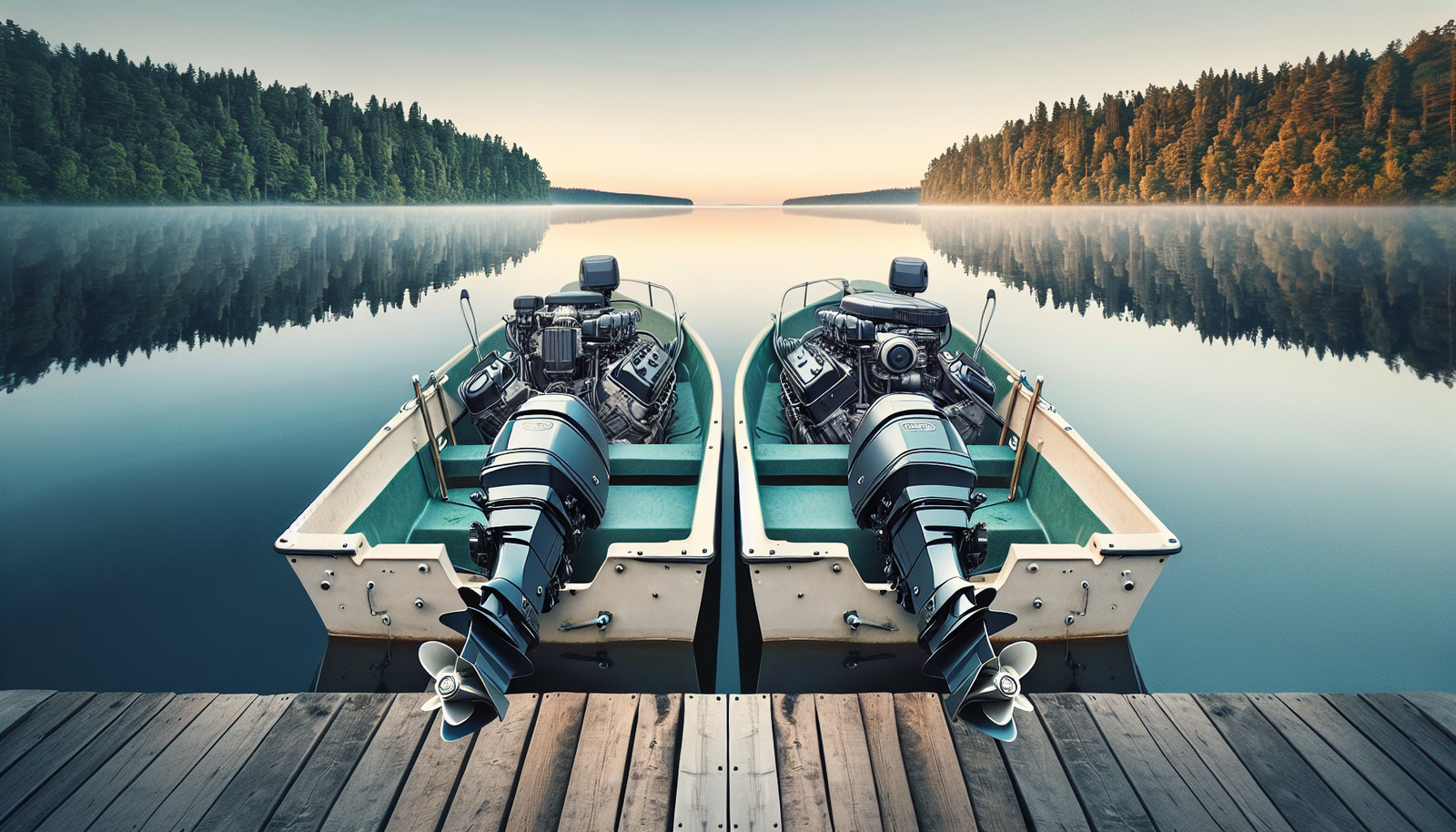Navigating the waters of boat ownership can be a challenging process, with one of the biggest decisions being choosing between outboard and inboard engines. This core component plays an influential role in factors such as maneuverability, speed, maintenance, and cost. As you set out to buy a boat, it’s crucial to understand these engines’ ins and outs to make an informed decision that suits your needs. This Buyer’s Guide will take you through the key differences and benefits of outboard and inboard boat engines, equipping you with all the knowledge needed to streamline your boat purchasing journey.
Understanding Boat Engine Basics
Let’s start with the basics, shall we? A boat engine, in the simplest terms, is the force that moves your boat. Essentially, it is a machine that converts various forms of energy into mechanical energy to propel your beloved boat through the water.
Definition of a Boat Engine
At its core, a boat engine is a machine designed to ingest a fuel source and convert it into motion. This process, known as internal combustion, produces energy that drives the boat forward. Most boat engines are either powered by gasoline or diesel, although there are some electric and hybrid models out there.
The Function of Boat Engines
What does a boat engine do, you ask? Well, they are the heart of your boat, pumping power through its ‘veins,’ which in turn propel it through water. Depending on the size and type of your boat, as well as the type of engine, your boat can perform a variety of tasks; from leisurely lake cruising to high-speed exhilaration on open water.
The Importance of Choosing the Right Boat Engine
It’s crucial to choose the right engine for your boat. An engine that’s too weak won’t get you far, while one that’s too powerful could pose safety risks. Plus, different engines are suited to different types of boating experiences, affecting everything from speed to fuel efficiency, handling, and maintenance requirements.
Types of Boat Engines
So, you know you want a boat and you understand why you need an engine. But what type of engine should you choose? There are primarily four types of boat engines: outboard, inboard, sterndrive, and jet propulsion engines. Each one has its pros and cons, which we will delve into now.
Outboard Engines
Outboard engines are mounted on the outside of the boat, at the stern. What makes them distinct is the housing, which includes the engine, gearbox, and propeller in one unit. They can tilt up while not in use, decreasing the risk of corrosion or damage from debris.
Inboard Engines
On the flip side, you have inboard engines. As the name suggests, these are installed inside the boat, usually toward the middle of the hull. They’re commonly used in larger boats and boast a lot of power. Nevertheless, they can’t tilt up so are more likely to be damaged by debris.
Sterndrive Engines
Sterndrive engines, a hybrid of inboard and outboard models, offer some advantages of both. These engines are installed inside the boat but drive a propeller mounted outside.
Jet Propulsion Engines
Lastly, there are jet propulsion engines. Instead of using a propeller, these engines suck in water and eject it under high pressure to propel the boat. As this does not involve exposed propellers, they can provide an increased level of safety.
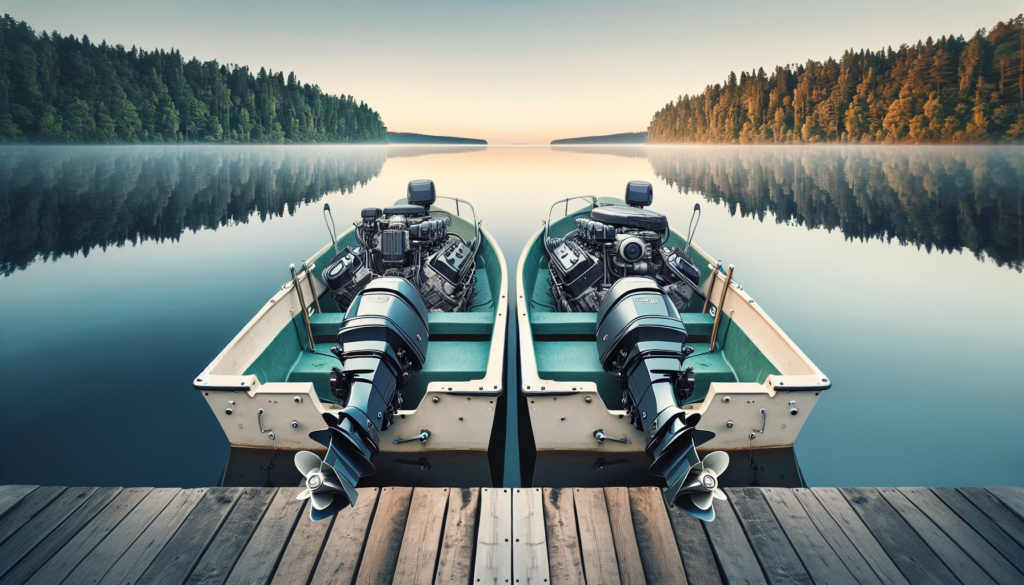
Detailing Outboard Boat Engines
Now, let’s dig a little deeper into outboard engines.
Mechanics of Outboard Engines
Outboard engines are quite nifty in their design. The motor, gearbox, and propeller are all contained in a single unit on the exterior of the boat. When you turn the wheel or handle, you’re controlling the direction of the entire engine, which in turn changes the course of your boat.
Pros and Cons of Outboard Engines
So, why might someone choose an outboard engine? For starters, the exterior positioning is a big plus, as it allows for more cabin space. They’re also relatively easy to maintain and fix. However, outboards are not always the best for high-speed performance or large loads, and they can be noisy and create high vibration.
Ideal Usage for Outboard Engines
Outboard engines are great for small to mid-size boats and are commonly used in fishing boats, pontoons, and speedboats. They’re ideal for shallow waters because you can tilt the engine out of the water to prevent damage.
Understanding Inboard Boat Engines
Let’s shift gears and talk about inboard engines.
Mechanics of Inboard Engines
Unlike an outboard, the design of an inboard engine has it positioned inside the boat’s hull. The propulsion is created by the engine driving a shaft that passes through the boat’s bottom, attached to a propeller that moves your boat forward.
Pros and Cons of Inboard Engines
Inboard engines are quieter, more fuel-efficient, and provide smoother operation than outboards. They’re also more powerful and suitable for bigger boats and heavier loads. However, maintenance can be trickier as the engine is based inside the boat and problems are not as directly accessible.
Ideal Usage of Inboard Engines
Inboard engines are a standard choice for large recreational boats, cruising boats, and yachts. They’re also commonly used in activities like water skiing and wakeboarding due to the wake they create. They’re not ideally suited for shallow waters as the underwater parts can’t be lifted out of the water.
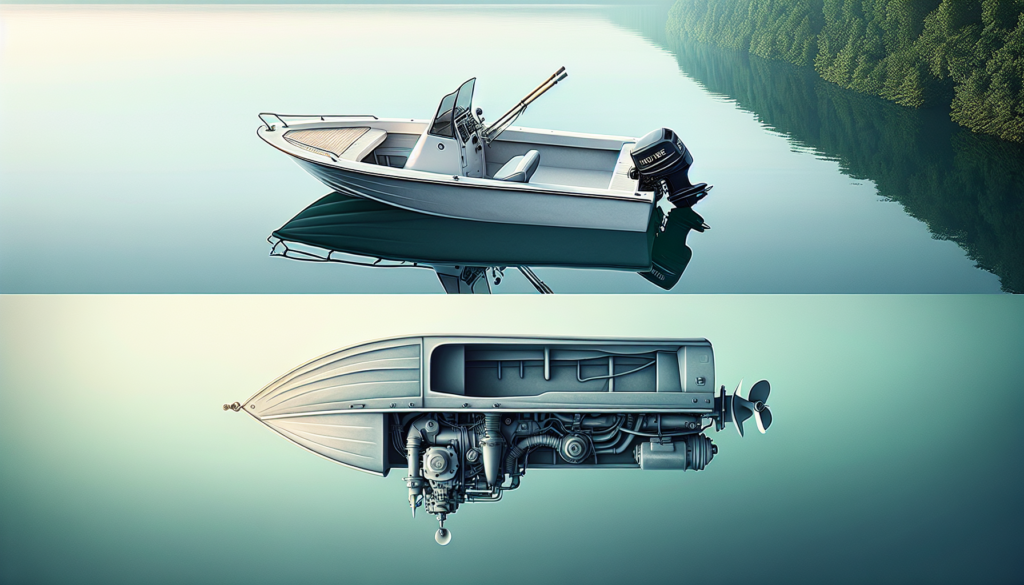
Key Differences Between Outboard and Inboard Engines
Location and Installation
Perhaps the most obvious difference between these engines is their location on the boat. Outboards are at the stern and hang off the back of the boat, while inboards are located inside the boat, usually toward the center. This positional difference also impacts installation – an outboard engine is simpler to install, whereas an inboard may require more complex installation.
Maintenance and Repair
Maintenance and repairs are simpler with outboard engines because they’re more accessible. In contrast, inboard engines are inside the boat, making them tougher to reach for routine maintenance.
Performance and Speed
Speed and performance are where your choice of engine really comes into play. Inboard engines are typically more powerful and provide greater speed than outboards. They’re ideal for towing, large boats, or rough water conditions. However, outboards are more suitable for shallower waters and offer more agility.
Fuel Efficiency and Environmental Impact
Inboard engines are typically more fuel-efficient than outboards, therefore, slightly better for the environment. However, advancements in technology are helping decrease the environmental impact and increase the fuel efficiency of outboard engines.
Cost Considerations
As for cost, outboard engines are usually less expensive upfront. However, inboard engines can often be more economical in the long run when considering fuel efficiency and potential lifespan.
Factors to Consider When Choosing Between Outboard and Inboard
Choosing between an outboard and an inboard engine depends on a number of factors.
Type of Boating Activity
What will you use your boat for? Different engines are better suited to different activities. If you’re planning water sports, you may want an inboard engine for the wake. On the other hand, if you’re going for fishing in fairly shallow water, an outboard engine is a better choice.
Budget and Long-Term Costs
Budget is a major factor in your decision. While outboard engines may be cheaper at the outset, consider the long-term cost implications of fuel efficiency and potential repair costs.
Maintenance and Upkeep
Think about how willing and able you are to take care of your engine. As mentioned earlier, Outboard engines are easier to maintain.
Expected Boat Performance
Consider the performance you want from your boat. If you need more power, greater speed, and a smoother ride, an inboard might be for you.
Personal Preference and Comfort
Lastly, your own preference plays a role too. Some people prefer the humming of an outboard engine, while others enjoy the quiet operation of an inboard.
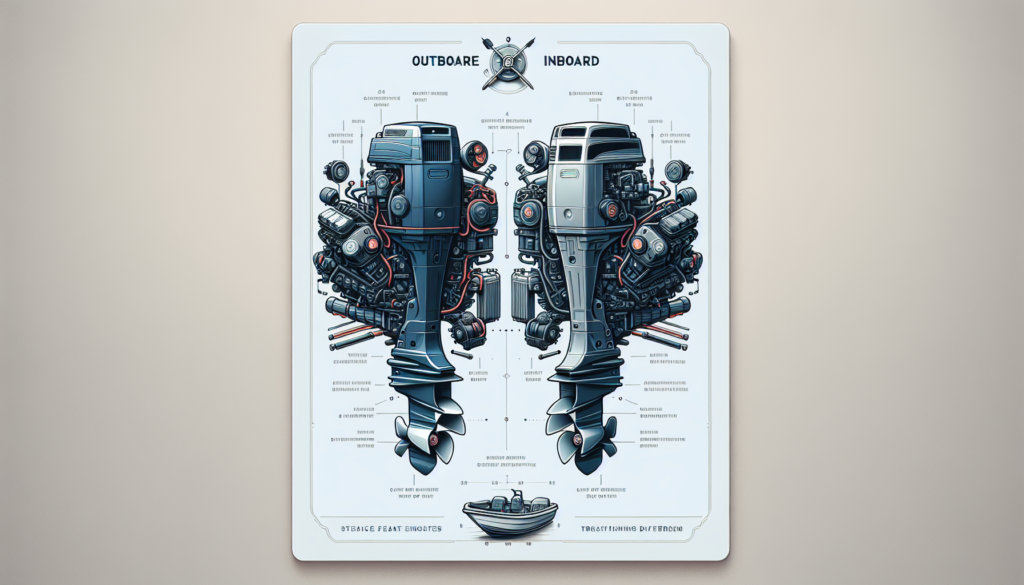
Buyer’s Tips for Selecting the Right Boat Engine
Doing Proper Research
Investigate various boat models and engine types. Read product reviews and forums. This will allow you to make an informed decision, and avoid potential pitfalls.
Consultation with Experts
Don’t hesitate to consult with experts. Speak to professionals and other boat owners to get their insights and experiences. They can provide important, practical advice that can make a difference in your decision-making process.
Checking for Warranty and Service Support
Before making the final decision, check if the engine has a good warranty and service support. This can give you peace of mind, particularly if you are buying a more expensive engine.
Considering Resell Value
Lastly, if you may possibly sell your boat in the future, consider the resale value. Inboard engines often result in a higher resale value than outboard engines.
Maintaining Your Boat Engine: Outboard vs. Inboard
Routine Maintenance Tips for Outboard Engine
Regular service of your outboard engine can extend its life. This includes changing your oil and filters, flushing after each use (especially in saltwater), periodic spark plug replacement, and keeping it clean.
Routine Maintenance Tips for Inboard Engine
Similarly, an inboard engine requires routine maintenance. Change the oil and filter, inspect drive belts, and maintain the coolant system. Also, check the propeller and engine alignment regularly.
Troubleshooting Common Issues
Troubleshooting is part and parcel of boat ownership. Outboard engines can often be fixed with a good set of tools and some elbow grease, while inboard engines may require professional help.
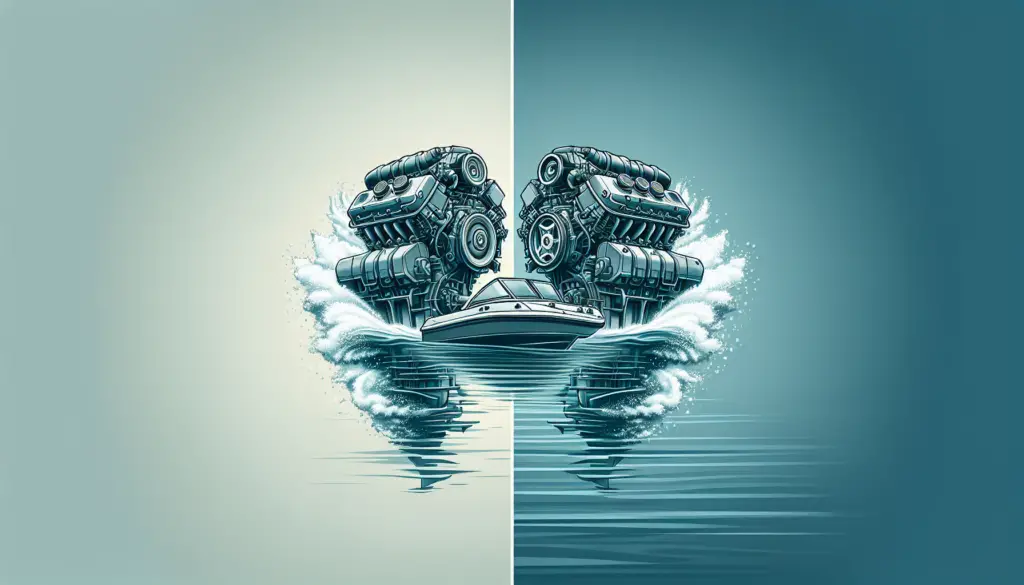
Understanding Boat Engine Regulations and Certifications
Emission Regulations
Regardless of the type of engine, you need to comply with emission regulations. Both outboard and inboard engines have specific emission standards they need to meet.
Noise Pollution Regulations
Likewise, there are restrictions on the level of noise a boat engine can generate. Certain areas may have stricter regulations than others.
Certifications and Standards for Boat Engines
Lastly, engines should meet the certification and standards set by recognized marine organizations. This is typically a guarantee of safety and performance.
Conclusion: Making the Most of Your Boat Engine
Selecting the right boat engine is a crucial decision and should take into account your needs, budget, and personal preferences. Regular maintenance is the key to maximizing your boat’s performance and longevity, as well as reducing the risk of untimely mechanical failures. Be aware of regulations to ensure you are cruising safely, legally, and responsibly. Whether you choose an outboard or inboard engine, the important thing is you enjoy your boating experience. Happy sailing!

